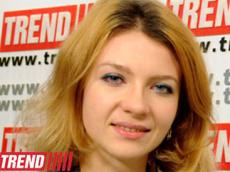Today.Az » Analytics » Ukraine revolution: to be continued
26 February 2014 [13:44] - Today.Az
 By Elena Kosolapova - Trend:
By Elena Kosolapova - Trend:
The popular revolt that rocked Ukraine in the recent weeks has attained all its desired goals, however not all Ukrainians are pleased with the new authorities.
The demonstrations in support of Ukraine joining the European Union which started in late November 2013 had gradually percolated into the riots that were televised, live, demanding the resignation of President Viktor Yanukovych and early election.
These demands were supported by people of different ethnic groups from all over the country.
Discontentment among Ukrainians was provoked by increased corruption and decreased living standards during Yanukovych's presidency. However many experts in economics believe that deterioration of the economy in the country came about as a result of the world economic crisis.
However, when Viktor Yanukovych disappeared and was believed to have fled the country, according some media reports, many Ukrainians were disappointed with the results of the revolution. In fact that all the power is currently held by the parties from Western regions whose initiatives contradict the interests of those living in the southern and eastern parts of the country.
One of the first moves of the new parliament was a ban on the law allowing ethnic groups to use their national languages at work and in local governments. This move upset the mostly Russian speaking populations of the eastern and the southern parts of Ukraine, who felt that such measures were a threat to their rights.
Moreover the eastern and southern Ukrainian are frighten by Nazi and nationalists slogans used by supporters of the new authorities, the toppling many statues of Lenin throughout the country and especially the statue of the Soviet Soldier in the Western city of Lviv. Over eight million Ukrainians or about 20 percent of the country's population perished in World War II, known in the Soviet Union as the Great Patriotic War. A number of great battles took place on its territory. That is why all issues concerning Nazism and victories of Soviet soldiers in that war are very sensitive issues for the majority of Ukrainians.
Moreover business, industry and tourism of Eastern and Southern Ukraine are oriented towards Russia and other CIS member countries. And people in these regions want to prevent breaking economic ties with Russia so as not to become unemployed. But the new authorities are not very benevolent to Russia.
That is why a number of "anti-maidan" meetings took place in eastern and southern cities of Ukraine. The protesters in a number of cities wave Russian flags and carry slogans like "Stop fascism", " Pro-fascists get out", "We are Slavs, Russian are our brothers," "Shame to Kiev", and so on.
Some of the protesters and regional deputies in the southern region of Crimea even urged Russia to intervene and to "protect them from fascism" or even to annex this region.
One of the largest meetings was in the city of Sevastopol which is home of Russian Black Sea Naval fleet on Feb. 23 - the Day of Soviet and Russian Army. Over 30,000 people from the city's total population of 360,000 gathered here, somewhat unusual for this region where people tend to remain indifferent to politics.
The protesters adopted the Sacred War song as their anthem, previously used by revolutionists in Russia during the 1917 revolution. In short, the revolution in Ukraine is far from over, and the threat of civil war in the country is still real.
Moreover earlier Interim President Oleksandr Turchinov said there's no money left in the treasury and the economy was in a "catastrophic" state. If Ukraine has not received financial aid from abroad in near future it will face the risk of default.
With regard to severe economic situation in the country and discontents among the population the future of the current Ukrainian authorities remains quite uncertain.
|
|